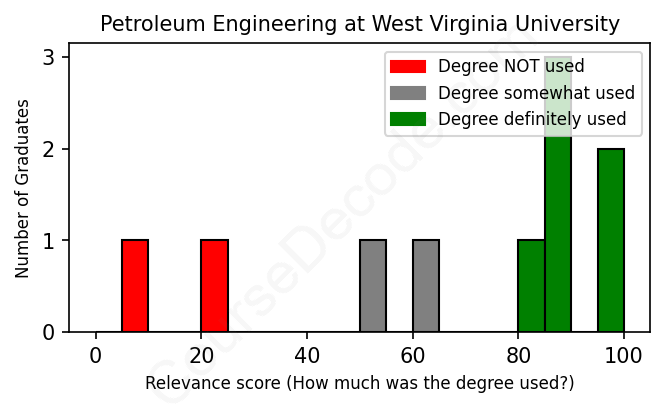
First, some facts. Of the Petroleum Engineering graduates from West Virginia University we've analyzed , here's how many have used (or NOT used) their degree in their career:

These are estimates based on AI analysis of 10 LinkedIn profiles (see below).
The verdict? Slightly above average. Overall, with an average relevance score of 68%, Petroleum Engineering graduates from West Virginia University have a slightly higher likelihood (+1%) of finding work in this field compared to the average graduate across all fields:
And for comparison, here's the chart for all profiles we've looked at across all degrees.
Also, after graduating, only 10% of these graduates have pursued further education other than another Bachelor's degree (such as a Masters degree or other), compared to the average across all profiles of 35%. This suggests a Bachelors degree is enough for most Petroleum Engineering graduates, and it's normal to look for work straight after graduation.
See the details:
|
Relevance score: 88% We think this person has gone into a career highly relevant to their degree. We think this person has gone into a career highly relevant to their degree.
DEGREE INFOGraduated in 2015 from West Virginia University with a Bachelor of Science - BS in Petroleum Engineering. No other secondary education since. JOB HISTORY SINCE GRADUATIONIndependent Engineering Consultant Standard Oil Company, Inc 2017 - Dec 2018 Production Engineering Manager  Standard Oil Company, Inc Jan 2019 - Dec 2019 Task Force  West Virginia Military Authority Nov 2020 - Jun 2022 Independent Contractor (Oil & Gas Industry)  Oil & Gas Companies (WV Based) May 2015 - Present Business Engineer  Paulico Resources Jun 2022 - Present ABOUTWest Virginia University Graduate,B.S. - Petroleum and Natural Gas EngineeringB.A. - Geography(GIS) - Geology - Communication StudiesWide array of work experience in the Oil and Gas industry. |
The top 10 most common jobs done by the graduates we've analyzed (ranked most common to least) are:
Based on the analysis of LinkedIn profiles from graduates of Petroleum Engineering at West Virginia University, it’s clear that many of them have found roles that are closely tied to their field of study, especially in the early years of their careers. A significant number have worked for companies like Halliburton and Chesapeake Energy in positions such as Field Engineers, Drilling Engineers, and other roles directly related to petroleum engineering. These jobs typically involve applying engineering principles and technical skills that align perfectly with their academic background, showing a strong connection between their degree and their work.
However, as careers continue, the relevance starts to wane for some. Graduates have taken roles in other sectors, like customer service management at fitness centers or even unrelated engineering positions, where the direct application of petroleum engineering seems limited. While some have aimed for project management and consulting positions where engineering skills may be used, the specific petroleum knowledge often isn't required. Overall, it seems that the earlier career stages are more directly aligned with petroleum engineering, while later on, graduates sometimes diverge into fields that don’t utilize their specialized training as much.
Here is a visual representation of the most common words in job titles for Petroleum Engineering graduates (this is across all Petroleum Engineering graduates we've analyzed, not just those who went to West Virginia University):

The career trajectories of graduates with a Petroleum Engineering degree from West Virginia University generally show a strong initial alignment with industry-related roles right after graduation. Many of them kick-start their careers as Field Engineers or in similar entry-level engineering positions, often with well-known companies like Halliburton and Chesapeake Energy. This suggests that the program effectively prepares students for the energy sector by providing relevant skills and fierce recruitment opportunities directly out of university.
As time goes on—about five to ten years after graduation—many graduates tend to move up within the industry. They often transition into roles like Project Manager or Drilling Engineer II, revealing a clear pathway to more senior positions within their field. Some, however, drift away from traditional petroleum roles into other industries or even unrelated fields, like customer service or retail. While many of the individuals continue progressing within the realm of petroleum or energy, the data indicates mixed outcomes where not everyone sticks with a job directly tied to Petroleum Engineering long-term. Overall, for those who stay in the field, it seems like a rewarding career with ample advancement opportunities. However, the shift to unrelated roles also highlights that some graduates may face challenges in sustaining their careers in the field long term, reflecting the volatility of the energy market and potential shifts in personal interests or economic realities.
Honestly, a Bachelor’s degree in Petroleum Engineering, including at West Virginia University, can be pretty challenging. It's known for being a rigorous program with a solid mix of math, physics, and engineering principles. You'll dive into complex topics like fluid mechanics, thermodynamics, and reservoir engineering, which can be tough if calculus and science aren’t your strong suits. Many students find it to be a step up from the average degree because it requires not only theoretical knowledge but also practical problem-solving skills. So, if you're considering it, just be ready to hit the books and put in some serious effort!
Most commonly, in the LinkedIn profiles we've looked at, it takes people 5 years to finish a Bachelor degree in Petroleum Engineering.
Based on the job paths of these Petroleum Engineering graduates from West Virginia University, it seems like they’re generally doing pretty well financially. A lot of them started off with solid positions at big companies like Halliburton and Chesapeake Energy, which are known for paying well, especially in engineering roles. As they gained experience, many moved into higher positions like project managers and team leaders, which usually come with decent pay increases. Even those who switched industries, like the ones who became consultants or project coordinators, seem to be holding their ground. Overall, it looks like most of these folks are on a solid financial track, making good money compared to what you’d expect for recent grads.
Here is a visual representation of the most common words seen in the "about" section of LinkedIn profiles who have a Bachelor degree in Petroleum Engineering (this is across all Petroleum Engineering graduates we've analyzed, not just those who went to West Virginia University). This may or may not be useful:

Here are all colleges offering a Bachelor degree in Petroleum Engineering (ordered by the average relevance score of their Petroleum Engineering graduates, best to worst) where we have analyzed at least 10 of their graduates:
| College | Score | Count |
|---|---|---|
 Texas A&M University Texas A&M University
|
80 | 25 |
 Louisiana State University Louisiana State University
|
79 | 26 |
 University of Oklahoma University of Oklahoma
|
78 | 20 |
 Texas Tech University Texas Tech University
|
77 | 20 |
 Penn State University Penn State University
|
75 | 11 |
 The University of Texas at Austin The University of Texas at Austin
|
75 | 18 |
 Marietta College Marietta College
|
70 | 20 |
 Colorado School of Mines Colorado School of Mines
|
69 | 30 |
 West Virginia University West Virginia University
|
68 | 10 |
 University of Houston University of Houston
|
67 | 19 |
 University of Louisiana at Lafayette University of Louisiana at Lafayette
|
63 | 10 |